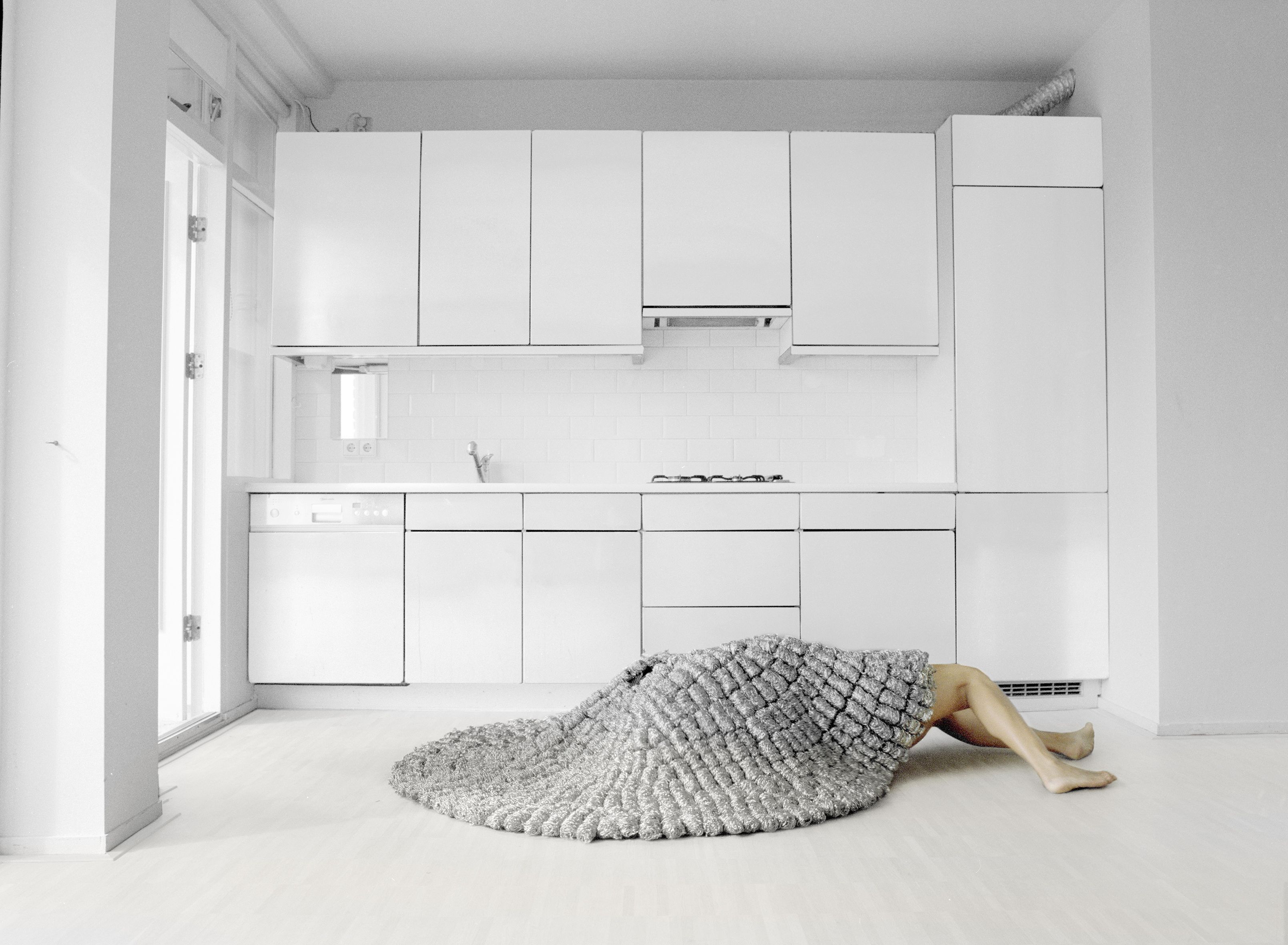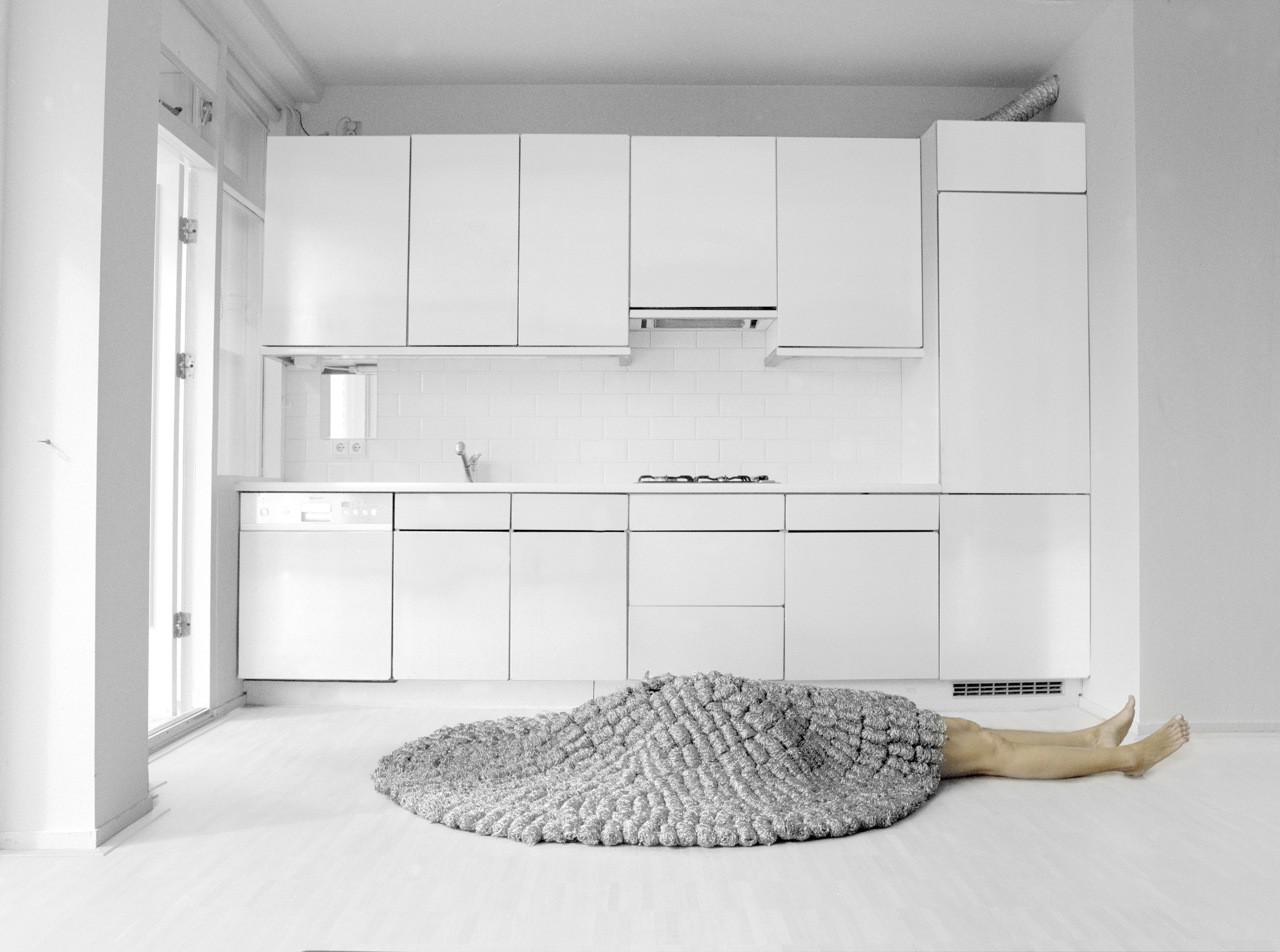Madrid , 2017
ABSALON IN CUBA
Dress made out of 570 nanas (aluminium scourers). Domestic demonstration
2 photos, 112 cm x 152 cm
With this work, the artist specifically draws attention to the current state of women living in Cuba. The photo print shows a dress that consists of 570 nanas (aluminum scourers) functions as Framis’ absurd act to protect the unprotected. The scourers in this dress symbolize the absurdity of the impossibility of protecting oneself in a house without protective laws regarding women. To find security between the walls of the house, like the elephant that hides behind the mouse to mislead its enemy, women protect themselves in their kitchens with scourers, nails, and teeth.
Regarding the interviews she has been able to have with Cuban women, the interview she had with a Cuban refugee in Miami stands out. This woman has been banned from entering the island because she investigated the position of women in Cuba and the lack of protection for Cuban women in their own homes.
Here are some extracts from the interview:
“In some periods of the year there are some signs that there is an awareness of this problem, but it is simply to “wash the faces” of politicians, because the women who really need help and leave their homes do not receive the promised support”
And according to her words: “the Cuban government exports a false image of gender equality, an equality that is contested in Cuban homes, and which is also very contradictory, because “the crime” of opposing the regime is sanctioned with 20 years of jail, but for maltreating a woman the punishment is very low and many of the complaints are not processed. Until now, the urban penal code has not had the crime of gender related and interfamily violence. Neither restraining orders apply, nor do precautionary measures such as preventive detention of the aggressor. None of the “houses” created for FMC (The Federation of Cuban Women) provide help, housing, or shelter to the victims of gender related violence. Since 2013, the UN and international NGOs have been pressing the Cuban regime to reform laws to protect women.
“The image that is sold of Cuba as an egalitarian society is only a mask for the terrible reality. ” Anonymous Woman
In the photos we see a woman stretched out in a white space. This white space is the kitchen of the artist who has transformed it into an “Absalon space”. The artist Absalon (1964, Ashdod) works in turning domestic spaces into concepts, into ideas. For Framis it does not matter what the kitchen is. What is important is the idea of a kitchen, which stands for the kitchen of all those women who are, or have been found, unprotected from society, from the neighbourhood or from their family or partner. The photo represents the concept of a universal kitchen, with a global gender violence problem.
Absalon speaks of his “room cells” as a refuge, but can kitchens become a safe haven for these women?
With the “room cells” Absalon built his own shelter, which protected him from the outside, whereas the Cuban woman is exposed inside and outside her cell to a vital insecurity.
The act of making a dress of lullabies for a month has been for the artist the absurd act of protecting the unprotected.
The lullabies in this dress are the absurdity of the impossibility of protecting oneself in a house without protective laws regarding women. To find security between the walls of the house, like the elephant that hides behind the mouse to mislead its enemy, women protect themselves in their kitchens with scourers, nails and teeth.


With this work, the artist specifically draws attention to the current state of women living in Cuba. The photo print shows a dress that consists of 570 nanas (aluminum scourers) functions as Framis’ absurd act to protect the unprotected. The scourers in this dress symbolize the absurdity of the impossibility of protecting oneself in a house without protective laws regarding women. To find security between the walls of the house, like the elephant that hides behind the mouse to mislead its enemy, women protect themselves in their kitchens with scourers, nails, and teeth.
Regarding the interviews she has been able to have with Cuban women, the interview she had with a Cuban refugee in Miami stands out. This woman has been banned from entering the island because she investigated the position of women in Cuba and the lack of protection for Cuban women in their own homes.
Here are some extracts from the interview:
“In some periods of the year there are some signs that there is an awareness of this problem, but it is simply to “wash the faces” of politicians, because the women who really need help and leave their homes do not receive the promised support”
And according to her words: “the Cuban government exports a false image of gender equality, an equality that is contested in Cuban homes, and which is also very contradictory, because “the crime” of opposing the regime is sanctioned with 20 years of jail, but for maltreating a woman the punishment is very low and many of the complaints are not processed. Until now, the urban penal code has not had the crime of gender related and interfamily violence. Neither restraining orders apply, nor do precautionary measures such as preventive detention of the aggressor. None of the “houses” created for FMC (The Federation of Cuban Women) provide help, housing, or shelter to the victims of gender related violence. Since 2013, the UN and international NGOs have been pressing the Cuban regime to reform laws to protect women.
“The image that is sold of Cuba as an egalitarian society is only a mask for the terrible reality. ” Anonymous Woman
In the photos we see a woman stretched out in a white space. This white space is the kitchen of the artist who has transformed it into an “Absalon space”. The artist Absalon (1964, Ashdod) works in turning domestic spaces into concepts, into ideas. For Framis it does not matter what the kitchen is. What is important is the idea of a kitchen, which stands for the kitchen of all those women who are, or have been found, unprotected from society, from the neighbourhood or from their family or partner. The photo represents the concept of a universal kitchen, with a global gender violence problem.
Absalon speaks of his “room cells” as a refuge, but can kitchens become a safe haven for these women?
With the “room cells” Absalon built his own shelter, which protected him from the outside, whereas the Cuban woman is exposed inside and outside her cell to a vital insecurity.
The act of making a dress of lullabies for a month has been for the artist the absurd act of protecting the unprotected.
The lullabies in this dress are the absurdity of the impossibility of protecting oneself in a house without protective laws regarding women. To find security between the walls of the house, like the elephant that hides behind the mouse to mislead its enemy, women protect themselves in their kitchens with scourers, nails and teeth.